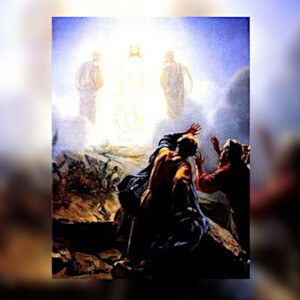


I must have heard at least ten sermons on the Transfiguration. And pretty much they were all the same! Summed up in a phrase, the message I got on all occasions was ...
Spiritual experiences are nice, but you have to “come down from the mountaintop” and get on with life.
Of course it's true, but it's bad exegesis. If that's the message you want to preach, take that other hilltop outside Jerusalem, when Jesus ascended, and directly told the disciples that very thing.
This mountaintop experience has got something else, which for some reason (touch of irony here which may become obvious later...) I've never heard talked about.
Leaving bad exegesis aside, what does this mountaintop remind you of? Of course, the law was given to Moses on a mountaintop. A bright cloud - God's intense presence - surrounded him. His face shone. Seems to fit better doesn't it?
And Moses was in the middle of an Exodus - a flight for freedom. And what did they talk about in this passage? His departure. The word departure in this verse is one used in the sense of “dearly departed” - i.e. died. But more interestingly the word in the Greek is the word exodon . They spoke of His exodus.
We know that that old story of Passover, of Exodus, of a new life in a new land, is a living prophecy, written in history, of what Jesus does for us here and now. Jesus himself used the parallels of Passover and Exodus to explain his own death, and resurrection.
But the cross and the exodus, the new and the old, are linked but remain completely different.
When the Children of Israel finally get free in the book of Exodus, it attended by violence, firstborn children die, soldiers drown, the battle is fought against flesh and blood human beings. And when they come into the new land, they do it with violence. Sure, Jerico was a wicked city, but can you imagine an invading army storming into Port De Prince shortly after that city was razed by the Haitian earthquake, and slaughtering all the remaining residents?
The way Jesus fulfills the exodus / new land story involves some radical departures in terms of implementation!
So frequently in the OT, there is so much violence that we struggle to come to terms with it. Only by ignoring the fact that the Midianites, and the Canaanites, and the Philistines were actually people – mums and dads and children and grandparents, can we make it seem temporarily palatable.
Take that uncomfortable and puzzling story of the prophet Elijah calling down fire from heaven to consume his enemies (2 Ki 1:10). Jesus doesn't try to reconcile this with the way we are supposed to behave. He simply rejects it outright. When his disciples ask him
Jesus rebukes them...
Let me underline what Jesus says here: what kind of spirit you are of. You only have two choices. Either you read the OT with the spirit of Christ, or you read it with a spirit that sees God as a destroyer not a saviour.
We cannot simply read the OT as Christians and assume that it gives us a true picture of God. In the OT we see at best a vague shadow or outline. So don't bring concepts of God character derived from your OT reading, and try to match this with the character you see in Jesus Christ. Instead, let the radical life of Jesus, in all its humanity, and humility, its power and its paradoxical weakness, in its serving and its ruling, redefine God's true nature for you.
It's an old adage – we read the OT through the NT, but what on earth does that really mean? Well we know on occasions it will mean a different emphasis, on others a different direction, and on others a 180 degree turn.
This is how Jesus read the OT. In fulfilling the law, some parts of it were totally reversed, changing the laws condoning enemy-hatred into a command to love them.
You may be thinking, haven't we wandered off the point here. How does this fit in with the transfiguration? Well, you know how the story continues.
Peter finally recovers from his terror, and as usual, speaks without thinking! “Lord let's build three tabernacles." Peter wants to create something which will enshrine this moment into something permanent.
He wants to build something institutional based on the Law + the Prophets + Jesus.
And we know what happens. God envelops them, he disappears Moses and Elijah, and Jesus is left standing alone. God's voice is heard saying
To men like Peter, James and John, who are struggling with Jesus radical reading of the OT, struggling with a new concept of what God wants, a concept that not only expands the plan from the nation of Israel to the whole world, building on the Law and the Prophets, yet at the same time, radically reversing some of their previous understanding, this is a very clear statement.
What Jesus says trumps whatever you have understood from the lives of Moses and Elijah, and from the Law and the Prophets.
Take a second look at how Jesus uses OT scripture … or Paul. You must have noticed how they seem sometimes to play fast and loose with it, pulling it out of context, and sometimes reshaping it within a NT construct. The only explanation is that they were led by the Holy Spirit to do just that. The early church had to read their OT this way, otherwise they would have simply created a offshoot Jewish cult. The church fathers grappled with this too. So if you want to be truly faithful to your Christian heritage, there's the challenge.
You don't have to pretend any more that OT religious violence is okay because you think God must have said so. You don't have to pretend it really was okay to stone people. You can stand alongside Jesus as he truly reveals the character of God.
One More Important Lesson From The Transfiguration
This New Testament we have is not really the new testament! When Moses came down from the mountain, he carried from God the tablets of stone. That Old Deal or Old Testament was written down. But what Peter, James and John had at the end of the day was not anything remotely resembling a document.
They had had an encounter, with the personality of God. They were encountering him every day, of course, in the “normal” course of Jesus life. Now they encounter a different side to him. His face is shining, he is surrounded by a kind of solid overpowering light, which pours out of him.
And this new deal or new testament, is not a document. It would be, as the scriptures say, written on our hearts, written in our minds.
God's plan is for each to personally encounter the glory of Christ, to lead to his life-spirit filling men and women, and the loving selfless character of God spontaneously creating a new community, which mystically becomes united with God finally, as a bride is united with her groom.
Unfortunately, christendom and christianity and the organised church cannot really deal with all this individual freedom and spontaneous unity and spirit led living.
So again and again, you will find the organised church trying to hedge people around with formal membership lists, written documents, structures and rotas and written responsibilities, hierarchies and special clothes and special days and special seasons. Extra creeds to learn and sign up to.
OK, so we have to live with this stuff!!
But let us never believe that this is what we are called into. No, it is into an encounter with a living God, one who turns upside down our notions of who he is, and of who we are.

